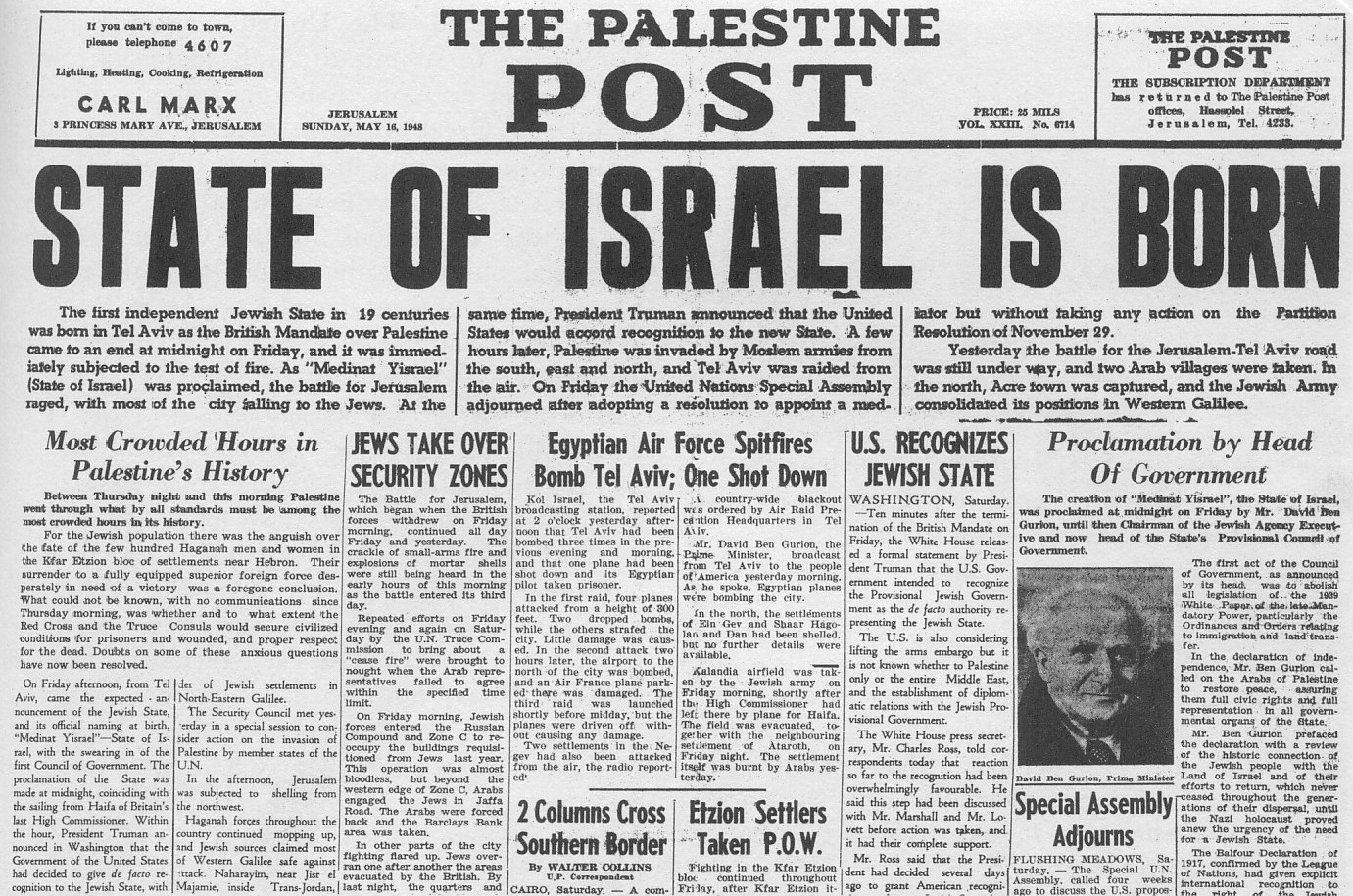Annexing the Jordan Valley
Declaring Israeli sovereignty in the Jordan Valley - with its obvious strategic significance and relatively small population of Palestinians - is a demand shared across the Israeli political mainstream.American Zionist Movement: The Path to Independence and Recognition: Why San Remo Matters
Israel can even plausibly claim that extending sovereignty to the area between the West Bank ridgeline and the Jordan River would be a coordinated move, rather than a unilateral one: The U.S. peace plan framework foresees permanent Israeli control over the area and doesn't condition a change in status on any peace agreement with the Palestinians.
A significant share of Israeli leaders, and the people who elect them, believe they now live in a region where the consequences of such a move are manageable. By their logic, the Arab states need Israel too much to scuttle relations over what amounts to less than a quarter of the West Bank, especially when such action would be consistent with an American peace plan that most regional governments have endorsed.
American recognition of Jerusalem as Israel's capital and relocation of its embassy there, as well as endorsement of Israel's annexation of the Golan Heights, were moves that were long believed to be too provocative to ever carry out. Instead, when they happened, they were all relative nonevents.
Dore Gold, Israel's former ambassador to the UN, director-general of the Ministry of Foreign Affairs, and confidante to both Benjamin Netanyahu and the late Ariel Sharon, was one of a small number of Israelis outside of government who routinely consulted with Jared Kushner, Jason Greenblatt, and U.S. Ambassador to Israel David Friedman about the U.S. peace plan. "I was in it to try to help formulate a plan that would provide a consensus basis for Israel's future borders," Gold recalled.
The Jordan Valley was hardly a new issue for Gold. In 1997, he accompanied Netanyahu to the Map Room of the White House, where they presented President Clinton's peace process team with an "interest map" of the West Bank that highlighted areas Israel believed to be of critical importance, the Jordan Valley included.
Until the American invasion of Iraq in 2003, it was believed Saddam Hussein's army could cross the Kingdom of Jordan and reach Israeli-controlled territory in 36 hours. Even with that scenario foreclosed, Gold thought Israeli planners needed to work across a longer time scale than the life of a single leader or even a single regime. "Military planning, especially strategic planning, should never be scenario-specific," Gold said.
"I personally had the view, which got backing from the prime minister's office, that in places like the Jordan Valley where Israel had the highest security interests, it would have to seek actual sovereignty over the territory." This argument repudiated decades of peace process doctrine, which defaulted to treating the valley as territory in a future Palestinian state.
Join the American Zionist Movement and the Israel Forever Foundation to celebrate the 72nd anniversary of the May 14, 1948 Declaration of the State of Israel, its immediate recognition by the United States, and to mark the important Centennial of the San Remo Conference.
Melanie Phillips: A muffled consensus serves not Israel but her enemies
The claim that the restoration of Jewish sovereignty over parts of the West Bank would destroy the possibility of a Palestinian state is untrue. Every serious Middle East peace plan has accepted the eventual incorporation into Israel of the major settlement blocs to safeguard its security.Caroline Glick: Pompeo, the coronavirus and the 'risks' of sovereignty
It is the Palestinians who have destroyed the possibility of a Palestinian state. Offered it repeatedly from the 1930s onwards, they have refused it every time. Nine decades of the Palestinians rejecting the two-state solution might possibly mean that the Jews aren't the obstacle.
Opposition to the "annexation" is driven by the belief that Israel illegally occupies these territories. But this is untrue. As several legal experts have pointed out over the years, the Jews are the only people to have a legal and moral right to this land. In 1922, the international community gave them the never-abrogated right to settle what is now Israel and the disputed territories. Restoring Israeli sovereignty to parts of Judea and Samaria will therefore actually correct a historic act of illegality. And it will help protect Israel against its existential enemies.
On Sunday, Saudi journalist Abdelhameed al-Ghoban gave an interview to the BBC in Arabic. His remarks, which were translated by MEMRI, were devoid of nuance.
"Today, the public is informed. There is a deluge [of opinions] against the Palestinian cause. It is no longer just public support for normalization and building ties with Israel. [Our] public has turned against the Palestinians in general. Unfortunately, the Palestinians have lost. The Palestinians have not contributed anything. We can say that they are emotional people whose behavior is governed by their feelings."
Al-Ghoban added, "It is in our strategic interest, and in keeping with our future economic interests, to maintain real relations with Israel. Israel is an advanced country and we can benefit from it."
Al-Ghoban's remarks are not a lone voice in the wilderness. During the Ramadan Muslim holy month, Saudi television networks broadcast two series that portray Jews and Israelis in a positive light.
Palestinian leaders are beside themselves at what they view as pan-Arab abandonment. In remarks to Israel Hayom this week, a senior Palestinian official bitterly referred to the mild criticisms of US President Donald Trump's peace plan and of Israel's plan to apply its sovereignty to its communities in Judea and Samaria and to the Jordan Valley as no more than "lip service."
Israeli leftist groups are hanging their hopes for torpedoing Israel's sovereignty plans on the European Union. France's plan, supported by Luxemburg, Belgium and Ireland to impose EU sanctions on Israel in the event it implements its sovereignty plan was widely reported this week.
But like the Palestinians, Israeli leftists are likely to be disappointed. EU rules require all decisions to be made by consensus. And there is no consensus on sanctioning Israel.


































